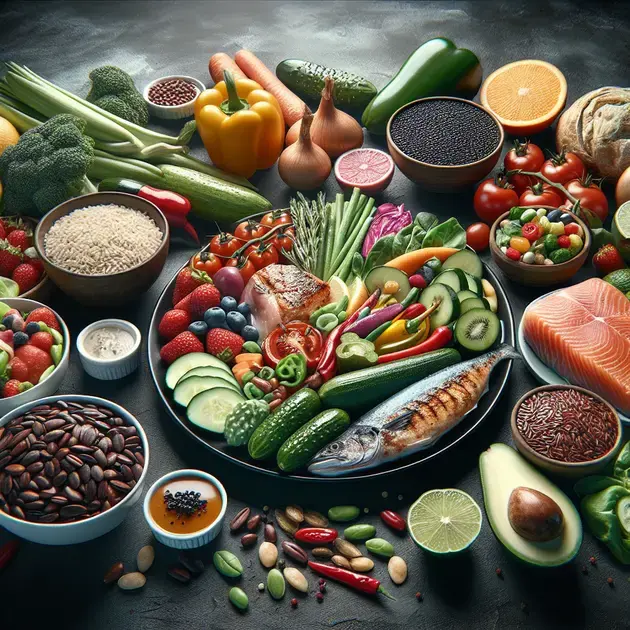When it comes to achieving effective weight loss goals, optimizing calorie intake plays a crucial role in determining success. Understanding how to balance the calories you consume with the calories you burn can make all the difference in your weight loss journey.
Recent studies have shown that focusing on optimizing calorie intake rather than restricting certain food groups can lead to more sustainable and long-lasting results. By making informed choices about the types and quantities of food you eat, you can create a calorie deficit that is conducive to weight loss.

Optimizing Your Calorie Intake for Weight Loss Success
When it comes to weight loss, understanding and optimizing your calorie intake is crucial for success. One effective way to do this is by tracking your daily food consumption. Apps like MyFitnessPal or Lose It! can help you easily log your meals and snacks, providing valuable insight into your calorie intake. By consistently tracking what you eat, you can identify areas where you may be consuming excess calories and make adjustments accordingly.
In addition to tracking your calories, it’s important to focus on the quality of the foods you consume. Opt for nutrient-dense options like fruits, vegetables, lean proteins, and whole grains. These foods not only provide essential vitamins and minerals but also help keep you full and satisfied, making it easier to stick to your calorie goals.
Another key aspect of optimizing your calorie intake is understanding portion sizes. Apps like Fooducate or Portion Control can guide you in selecting appropriate portion sizes for different foods. By being mindful of portion control, you can avoid overeating and stay within your daily calorie limit.
Furthermore, staying hydrated is essential for weight loss success. Drinking water throughout the day can help curb cravings and prevent overeating. Apps like WaterMinder or Hydro Coach can remind you to stay hydrated and track your daily water intake, ensuring you maintain optimal hydration levels.
Lastly, seeking guidance from a nutritionist or dietitian can provide personalized recommendations for optimizing your calorie intake. These professionals can help create a customized meal plan based on your individual needs and goals, making it easier to achieve sustainable weight loss.
The Importance of Balancing Calories Consumed and Burned
One of the fundamental principles of weight loss is maintaining a balance between the calories you consume and the calories you burn. To achieve this balance, it’s essential to understand your daily energy requirements. Websites like Healthline or MyPlate can help you calculate your total daily energy expenditure based on factors like age, weight, height, and activity level.
Incorporating physical activity into your routine is key to burning calories and reaching a calorie deficit. Apps like Fitbit or Strava can track your workouts and daily steps, giving you a clear overview of the calories you’ve burned. By engaging in regular exercise, you can increase your calorie expenditure and support your weight loss goals.
In addition to exercise, paying attention to your metabolism can impact your calorie balance. Foods like green tea, chili peppers, and lean proteins can boost metabolism and help burn more calories throughout the day. Including these metabolism-boosting foods in your diet can support your efforts to achieve a calorie deficit.
Monitoring your progress is essential for maintaining a balance between calories consumed and burned. Apps like MyNetDiary or Cronometer can help you track your food intake and exercise, allowing you to adjust your calorie goals as needed. By regularly monitoring your calorie balance, you can make informed decisions to support sustainable weight loss.
Remember, achieving a balance between calories consumed and burned is a key factor in long-term weight management. By being mindful of your energy intake and expenditure, you can achieve and maintain a healthy weight more effectively.
Making Informed Choices for Sustainable Weight Loss
When embarking on a weight loss journey, making informed choices is crucial for long-term success. One way to do this is by educating yourself on nutrition and the impact of different foods on your weight. Websites like EatThis.com or Health.com provide informative articles on healthy eating and weight loss strategies, helping you make better choices.
Another important aspect of sustainable weight loss is setting realistic goals. Apps like Noom or Weight Watchers can assist you in setting achievable targets for weight loss and tracking your progress. By setting realistic goals, you can stay motivated and focused on making sustainable lifestyle changes.
Incorporating variety into your meals can also support sustainable weight loss. Apps like Yummly or Fooducate can suggest new recipes and meal ideas to keep your diet interesting and balanced. By trying new foods and flavors, you can prevent boredom and ensure you’re getting a diverse range of nutrients.
Seeking support from a community or online forums can provide encouragement and accountability on your weight loss journey. Websites like Reddit’s r/loseit community or MyFitnessPal forums offer a space to connect with others who are also striving for weight loss, sharing tips and experiences along the way.
Lastly, prioritizing self-care and stress management is essential for sustainable weight loss. Apps like Headspace or Calm can guide you in practicing mindfulness and relaxation techniques to reduce stress levels. By taking care of your mental and emotional well-being, you can create a supportive environment for successful and sustainable weight loss.

Creating a Nutritious Meal Plan for Successful Weight Management
Creating a nutritious meal plan is essential for successful weight management. To start, it is important to focus on balanced meals that include a variety of food groups such as fruits, vegetables, whole grains, lean proteins, and healthy fats. Incorporating foods rich in essential nutrients like vitamins, minerals, and antioxidants can help support overall health and weight loss. Consider consulting with a nutritionist or dietitian to develop a personalized meal plan tailored to your specific goals and dietary needs.
When planning your meals, aim to include a mix of macronutrients such as carbohydrates, proteins, and fats in appropriate portions. This can help regulate blood sugar levels, promote satiety, and prevent overeating. Be mindful of portion sizes to avoid consuming excess calories, which can hinder weight loss efforts. Meal prepping can also be a helpful strategy to ensure that you have healthy options readily available, reducing the temptation to indulge in less nutritious choices.
Incorporating flexibility into your meal plan can make it more sustainable in the long term. Allow for occasional indulgences or special treats while prioritizing nutrient-dense foods the majority of the time. Remember that achieving successful weight management is not just about the foods you eat but also about establishing a healthy relationship with food and practicing mindful eating habits.
Tracking your food intake and progress can provide valuable insights into your eating habits and help identify areas for improvement. Utilize food journaling apps or online trackers to monitor your caloric intake, macronutrient distribution, and overall food choices. This can help you stay accountable and make informed decisions about your dietary patterns. Regularly review your meal plan and make adjustments as needed based on your progress and goals.
By prioritizing a nutritious meal plan tailored to your individual needs and goals, you can enhance your weight management efforts and support overall health and well-being. Consistency, balance, and mindfulness are key components of a successful and sustainable approach to achieving and maintaining a healthy weight.
Incorporating Physical Activity to Enhance Calorie Burn
Incorporating physical activity into your routine is crucial for enhancing calorie burn and supporting weight management goals. Regular exercise not only helps burn calories but also promotes cardiovascular health, boosts metabolism, and enhances overall fitness levels. Aim to engage in a mix of cardiovascular exercises, strength training, and flexibility exercises to create a well-rounded fitness routine.
Cardiovascular exercises such as running, cycling, swimming, or dancing can help elevate your heart rate and increase calorie expenditure. Incorporating interval training or high-intensity workouts can further boost calorie burn and improve fitness levels. Strength training exercises, including weightlifting or bodyweight exercises, are essential for building lean muscle mass, which can increase metabolism and calorie burn even at rest.
Make physical activity a priority by scheduling regular workouts throughout the week and setting specific goals to track your progress. Consider trying different types of exercises to keep your routine engaging and prevent boredom. Joining group fitness classes, working out with a friend, or hiring a personal trainer can provide motivation and accountability to help you stay on track with your fitness goals.
Listen to your body and adjust your exercise intensity and duration based on your fitness level and any existing health conditions. Incorporate rest days into your routine to allow for recovery and prevent overtraining. Remember that consistency is key when it comes to physical activity, so find activities that you enjoy and that align with your preferences and lifestyle.
By incorporating regular physical activity into your daily routine, you can enhance your calorie burn, improve your fitness levels, and support your overall weight management efforts. Stay motivated, stay consistent, and celebrate your progress along the way as you work towards achieving your health and fitness goals.
Conclusion
In conclusion, creating a nutritious meal plan is crucial for successful weight management. By focusing on a well-balanced diet that includes a variety of food groups rich in essential nutrients, you can support your overall health and weight loss goals. Consulting with a nutritionist to tailor a personalized meal plan can further enhance the effectiveness of your dietary efforts, ensuring that you meet your specific needs and objectives.
Additionally, incorporating physical activity into your routine plays a vital role in enhancing calorie burn and supporting weight management. A diverse fitness regimen that includes cardiovascular exercises, strength training, and flexibility exercises can help you achieve your fitness goals while promoting cardiovascular health and metabolism. By prioritizing regular workouts, setting specific goals, and listening to your body, you can maintain consistency and progress towards a healthier lifestyle.
Remember, successful weight management is not just about what you eat or how much you exercise, but also about establishing a balanced and sustainable approach that encompasses both nutrition and physical activity. By combining a nutritious meal plan with regular physical activity, you can optimize your efforts, enhance your overall well-being, and work towards achieving a healthy weight that lasts.